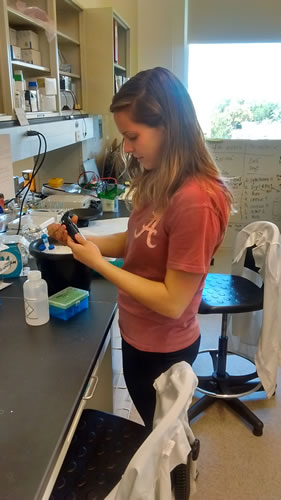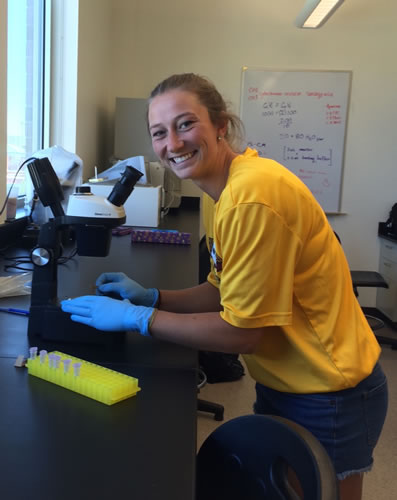Excellence in Teaching and Undergraduate Research
The Department of Biological Sciences at Colorado Mesa University is committed to providing exceptional opportunities in the classroom, laboratory and field where students are given the opportunity to discover the amazing diversity of life. Our curriculum allows students to tailor their education to their interests while providing a solid background in biological principles and practices. Our faculty are committed educators and researchers who strive to provide students with unique undergraduate research experiences.
Student Learning Objectives
Colorado Mesa University Biology graduates will be able to demonstrate:
- A broad, comprehensive knowledge of the main areas of biology (including evolution, ecology, cell biology, and genetics) and the ability to apply this knowledge to address new questions.
- The ability to use science as a way of thinking and problem solving. They will be able to make key observations, ask questions, formulate hypotheses, design experiments, collect and analyze data, draw logical conclusions, and explain and defend those conclusions to others.
- The ability to critically search, read, evaluate, and discuss primary literature.
- Effective biological communication skills, both in writing and orally.
A Spectrum of Coursework and Concentrations
Our professors integrate traditional approaches with innovative techniques to offer students exciting and challenging opportunities to learn in areas that span the breadth of the biological sciences, from molecular and cellular biology to human biology and health, including anatomy and physiology. Students explore plants, fungi, and microbes alongside courses in ecology, evolution, and organismal biology, such as fish biology, mammalogy, herpetology, and wildlife biology. Opportunities also extend into applied and interdisciplinary areas such as forensic science, conservation, and tropical ecology. This breadth, together with small class sizes and dedicated faculty, provides undergraduates with a premier education in the biological sciences.
The Department offers several concentrations that enable students to pursue either a broad education in Biology or a more specialized education in the field. The following concentrations are available:
- General Biology
- Ecology, Evolution, and Organismal Biology
- Cellular, Molecular, and Developmental Biology
- Secondary Education
For more information on these concentrations, please e-mail Dr. Margot Becktell or call her at 970.248.1892.
Outstanding Facilities
In the fall of 2010, an 18 million dollar expansion of the Wubben Science Complex was completed. With the new facilities and state of the art equipment, we have continued to increase our breadth of offerings in terms of teaching facilities and research opportunities for undergraduates. This has translated into classrooms that are more conducive to learning, laboratories that are better designed for hands-on experimentation and observation, and more resources for undergraduate research projects. In addition, our special collections in botany, entomology, mammalogy, ornithology, and herpetology now have increased room and access.
Opportunities Outside of Regular Coursework
Undergraduate Research
Participating in research during the school year and beyond is an important way in which students can immerse themselves in the process of science. Many of our undergraduates work with faculty mentors on collaborative research projects in areas such as cell biology, molecular genetics, plant pathology, molecular systematics, microbiology, and tropical ecology. Some of our students have even spent semesters doing research in the tropical rainforests of Ecuador. Faculty mentors and their undergraduate collaborators in our Department have gone on to win grants and recognition for their work.


The St. Mary's Saccomanno Research Institute/CMU Internship Program in Biological Research
This internship program provides an opportunity for highly motivated undergraduates and recent graduates to experience and perform hands-on biological research. Summer interns work under the guidance of an experienced scientist on a research project for 10 weeks, allowing participants to experience the excitement, challenges and creativity of scientific inquiry. Interns that are selected for the Program during the academic year will have the same experience spread over the fall and spring semesters. In both cases, research interns are compensated for the experience. More details are available in the application (available on the Undergraduate Research page).
Academic Honors Program in Biology
Getting involved in the Academic Honors Program in the Biological Sciences Department is an excellent way in which students can enhance the depth of their degree programs in Biology. For more information on the Program, please feel free to visit the Biology Honors webpage or contact the Biology Honors Program Contact/Advisor, Dr. Stephen Stern.
Internship and Independent Study
Working as interns or doing independent studies allow undergraduates to become more familiar with areas of knowledge that may relate to their career goals while earning college credit. Internships are usually student-driven; while advisors may help guide students toward opportunities, the responsibility for gaining the internship is on the shoulders of the student. Students then work with faculty advisors to complete the appropriate paperwork. Independent study credit is earned when students work on a semester-long project under the supervision of a faculty mentor. Students are responsible for approaching faculty in order to begin the process.
For more information on the Department, please e-mail Department Head Dr. Margot Becktell ([email protected]) or call her at 970.248.1892.
Specialized Preparation & Exceptional Opportunities
Research in Cell and Molecular Biology
Students who are particularly interested in concentrating their coursework and training in Cell and Molecular Biology have exceptional opportunities at Colorado Mesa University. In addition to taking courses such as Molecular Genetics (BIOL 425), Laboratory Investigations in Cellular and Molecular Biology (BIOL 371L), and Forensic Molecular Biology (BIOL 344 & 344L), students may do supervised UNDERGRADUATE RESEARCH on cell-cell signaling (including its applications to cancer research), animal molecular genetics, mitochondrial function, plant molecular genetics, and microbial genetics.
Field-oriented Courses and Field-based Research
Many of our professors take advantage of the spectacular habitats offered by the Western Slope by taking students out and about on field trips. The Colorado National Monument, the Bookcliffs, and the San Juan Mountains are some of the areas that serve as sites for fieldwork for courses such as Ornithology (BIOL 412 & 412L), Wildlife Management (BIOL 418 & 418L), and Advanced Ecological Methods (BIOL 405 & 405L). Field courses are also an important part of our offerings. Tropical Field Biology is offered based on the instructor's availability. Students with an interest in tropical ecosystems can apply to spend their summers doing UNDERGRADUATE RESEARCH in Ecuador!
Pre-professional Preparation
Many of our students successfully continue their educations in Medical Schools, Nursing Programs, Dental Schools, Physician Assistant Programs, Pharmacy Schools, and Physical Therapy Programs. Just as many have been admitted into Graduate Schools where they pursue their Master's degrees or their doctorates in a variety of fields ranging from ecology to molecular biology. We take our job in preparing them for success very seriously by working with them on an individual basis. We advise them on the required coursework, help them make the necessary contacts, and follow their progress closely.
